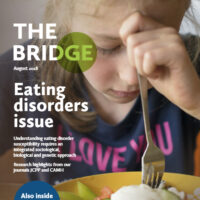Eating disorders
-

Body Dysmorphic Disorder with Dr Bruce Clarke and Dr Amita Jassi
Body Dysmorphic Disorder is a common, yet typically under-recognised and challenging to treat condition. Dr Bruce Clarke and Dr Amita Jassi highlight the common issues clinicians face when assessing and treating BDD and how to overcome these. ACAMH members can now receive a CPD certificate for watching this recorded lecture.
Read more -

Raising Awareness for Body Dysmorphic Disorder
BDD is not something that clinicians always think of, so what are the symptoms that we should be looking out for and what evidence-based treatments can help relieve the symptoms that people experience?
Read more -

How can we identify and treat Body Dysmorphic Disorder?
Body Dysmorphic Disorder is a mental health condition where a person worries about perceived flaws in their appearance — flaws that are unnoticeable to others, or else appear incredibly slight. It affects people of any age but is most prevalent in teenagers and young adults, and although common, it frequently goes unrecognised or misdiagnosed.
Read more -

Eating Disorders
Research digests on eating disorders from the August 2018 edition of The Bridge, ACAMH’s journal of secondary publication.
Read more -

Supporting Prepubertal Children with anorexia nervosa – a clinician’s experience
Five patients under the age of twelve have presented with Anorexia Nervosa in the last six months to our community CAMHS Eating Disorders Team, in the North of England, representing 16% of our average annual caseload.
Read more -

Eating disorders – Foreword from the Editor
Welcome to this edition of The Bridge which focuses on eating disorders.
Read more -

Body Dysmorphic Disorder
Body Dysmorphic Disorder is a common, yet typically under-recognised and challenging to treat condition. This talk gives a whistle-stop tour of what BDD is, highlighting the common issues clinicians face when assessing and treating BDD and how to overcome these. We will draw on clinical experience and the evidence-base to help increase knowledge and confidence […]
- Event type
- Twilight Meeting
- Location
- London
-

Persistent picky eating predicts pervasive developmental disorders in children
Picky eating — characterized by food refusal, unwillingness to try new foods or eating a limited variety of foods — affects 14-50% preschool children and is often considered by clinicians as a normal phase of child development.
Read more -

Targeting the neural task-control circuitry to enhance self-regulatory control in bulimia nervosa
Previous research has found that bulimia nervosa is associated with dysregulated self-regulatory control, as a result of anatomical and functional disturbances to the neural task-control circuitry in the brain.
Read more -

Infants of mothers with eating disorders show neurobehavioural and cognitive defects
Eating disorders can have serious adverse clinical, social and psychological outcomes in affected patients, but whether maternal eating disorders are associated with negative outcomes in newborns is unknown.
Read more